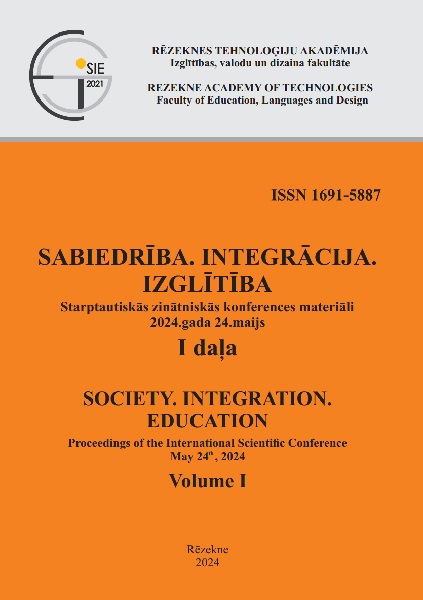REFLECTION OF TRANSPORT LOGISTICS' GRADUATES COMPETENCES IN THE VACANCY NOTICES FOR TRANSPORT MANAGERS POSITIONS
DOI:
https://doi.org/10.17770/sie2024vol1.7797Keywords:
competences, skills, the point of view of employer, transport logistics manager, vacancyAbstract
The contemporary landscape of the logistics industry is evolving, introducing fresh challenges for companies. Consequently, it is imperative to focus on the competency of employees and anticipate the skills that will be essential in the future. Therefore, it is important to not only identify professional competences of the logistics graduates but also to make sure that they coincide with the skills required by the labour market. To achieve this end, vacancy notices published in an online media (CV bank) in the last quarter of 2023 were collected and analysed. Then, the obtained results were compared to the identified competences of the graduates of Transport Logistics in 2023 at Vilnius College of Technologies and Design. The article reveals that vast majority of the graduates of Transport Logistics at the Vilnius College of Technology and Design have knowledge and skills that by large reflect the requirements laid out in the analysed vacancy notices.
References
Barbouletos, S. (2011). Discrepancy between role expectations and job descriptions: the impact on stress and job satisfaction. Retreived from: https://www.semanticscholar.org/paper/Discrepancy-between-role-expectations-and-job-the-Barbouletos/a335034960e8bce7935975a2058ee46033c66f33
Boyatzis, R. (2008). Competencies in the 21st century. Journal of Management Development. 27. DOI:10.1108/02621710810840730.
Chang, Chia-Hsun & Lin, Chi-Chang. (2018). Evaluating skill requirement for logistics operation practitioners: based on the perceptions of logistics service providers and academics in Taiwan. Asian Journal of Shipping and Logistics. 34. 328-336. DOI: 10.1016/j.ajsl.2018.12.006.
Čižiūnienė, K., & Vaičiūtė, K., & Batarlienė, N. (2016). Research on Competencies of Human Resources in Transport Sector: Lithuanian Case Study. Procedia Engineering, 134, 336-343. DOI:10.1016/j.proeng.2016.01.016
Dobroszek, J., & Mourao, P., & Grzesiak, L. (2019). Identification of the similarities and differences of logistics controller, manager and specialist: A study based on a content analysis. The International Journal of Logistics Management, 30(1), 261–283. DOI: 10.1108/IJLM-10-2017-0281
El asame, M. & Wakrim, M. (2018). Towards a competency model: A review of the literature and the competency standards. Education and Information Technologies. 23. 1-12. DOI: 10.1007/s10639-017-9596-z.
Elzarka, S. & El-Nakib, I. (2014). Skills Requirements for Entry-Level Logisticians: An Empirical Study of Academics and Practitioners Perception in Egypt. The Annual Logistics Research Network Conference At: Huddersfield, UK, Volume: LRN 2014. Retrieved from: https://www.researchgate.net/publication/346489337_Skills_Requirements_for_Entry-Level_Logisticians_An_Empirical_Study_of_Academics_and_Practitioners_Perception_in_Egypt
Feldman, D. C., & Bearden, W. O., & Hardesty, D. M. (2006). Varying the Content of Job Advertisements. Journal of Advertising, 35(1), 123–141. DOI:10.2753/JOA0091-3367350108
Ginavičienė, J., & Piščikienė, I., & Sprogytė-Bredelienė, I. (2023). Assessment of Transport Logistics' Graduates Competences from the Point of View of Employers. Society. Integration. Education. Proceedings of the International Scientific Conference. 1. 233-243. DOI: 10.17770/sie2023vol1.7117.
Hernández‐March, J., & Martin-del-Peso, M. & Leguey, S. (2009). Graduates’ Skills and Higher Education: The employers’ perspective. Tertiary Education and Management. Vol. 15. Nr. 1-16. DOI: 10.1080/13583880802699978.
Katinienė, A., & Jezerskė, Ž., & Vaičiūtė, K. (2021). Research on competencies of logistics specialists in transport organisations. Journal of Business Economics and Management, 22(5), 1308-1322. DOI: 10.3846/jbem.2021.15299
Liikamaa, K. (2015). Developing a Project Manager's Competencies: A Collective View of the Most Important Competencies. Procedia Manufacturing. 3. 681-687. DOI: 10.1016/j.promfg.2015.07.305.
Martinkus, B., & Neverauskas, B. & Sakalas, A. (2002). Management: quantitative and qualitative aspects of specialist training: monography. Kaunas: Technologija.
Messum, D., & Wilkes, L., Peters, K. & Jackson, D. (2017). Content analysis of vacancy advertisements for employability skills: Challenges and opportunities for informing curriculum development. Journal of Teaching and Learning for Graduate Employability. 7. 72. DOI: 10.21153/jtlge2016vol7no1art582.
Mühlbacher, J., & Nettekoven, M. & Putnova. A. (2009). Competence Development in The Czech Republic. Journal of Global Business and Technology, 5(2), 1-13. Retrieved from: http://www.jstor.org/stable/23281673
Orme, V. (2008). You will be …: a study of job advertisements to determine employers' requirements for LIS professionals in the UK in 2007, Library Review, Vol. 57 No. 8, pp. 619-633. DOI: 10.1108/00242530810899595
Osmani, M., Weerakkody, V., Hindi, N., Al‐Esmail, R., Eldabi, T., Kapoor, K., Irani, Z. (2015). Identifying the trends and impact of graduate attributes on employability: a literature review. Tertiary Education and Management. 21. 1-13. DOI: 10.1080/13583883.2015.1114139.
Prusak, R. (2016). The impact of employee competencies management as part of the human capital on the intellectual capital implementing process. Management. DOI:10.1515/manment-2015-0022
Puodžiukienė, D., & Aksomitienė, J. (2019). Darbuotojų kompetencijų atitiktis darbdavių lūkesčiams transporto ir logistikos įmonėse. Studijos kintančioje verslo aplinkoje. p. 144-150. Retrieved from: https://www.lituanistika.lt/content/82522
Singh, P., & Thambusamy, R. X., & Ramly, M. A. (2014). Fit or Unfit? Perspectives of Employers and University Instructors of Graduates’ Generic Skills. Procedia - Social and Behavioral Sciences, 123, 315–324. DOI: 10.1016/j.sbspro.2014.01.1429
Torkkeli, M. & Tuominen, M. (2002). The contribution of technology selection to core competencies. International Journal of Production Economics, 77 (3), pp. 271-284. DOI: 10.1016/S0925-5273(01)00227-4
Tsitskari, E., & Goudas, M., & Tsalouchou, E. & Michalopoulou, M. (2017). Employers’ expectations of the employability skills needed in the sport and recreation environment. Journal of Hospitality, Leisure, Sport & Tourism Education. 20. DOI: 10.1016/j.jhlste.2016.11.002.
Vaičiūtė, K., & Skirmantienė, J. & Domanska, L. (2017). Assessment of Transport Specialists’ Competencies in Transport/Logistics Companies. Procedia Engineering. 187. DOI: 10.1016/j.proeng.2017.04.423






